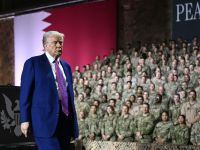Participants in a conference on the Libyan economy urged the government to liberalize the economy and eliminate family-owned monopolies. The Libyan economy, relying mainly on oil and gas, is dominated by a handful of rich families, including that of Libyan leader Colonel Moammar Gaddafi.
Last week's meeting, sponsored by the liaison office of the Libyan Revolutionary Committee, focused on restructuring the Libyan economy on the basis of "the third universal theory of the Green Book." The book is as sacred for Libyans as the Koran is for Muslims since Gaddafi, who advocates a socialist economy, wrote it.
The conference stressed the need to accelerate the development of local industries to satisfy the needs of the local market, while adapting the rules of the market to the country's economy.
Participants reaffirmed the importance of the fight against corruption in all the economic institutions, and the need for Libyan trade and the economy in general to take the African market into account.
Libya has begun a policy of pushing for the economic and political unity of the black continent in the face of growing globalization. Gaddafi accuses the West of impoverishing Africa and deliberately excluding it from all development efforts.
Oil accounts for some 95 percent of foreign currency earnings in an economy that had been hard hit by a seven-year United Nations embargo after the downing in 1988 of an American airliner over Lockerbie, Scotland, in which some 270 people were killed.
The situation was not helped by the fall in crude oil prices in the last 10 years. Libya's economy only started recovering in 1999 with the lifting of the embargo - after Libya handed over two suspects in the Lockerbie bombing - and the upturn in oil prices.
During the conference, Libyan economists insisted on the need to reorganize banking institutions as well as the internal and external investment supervising bodies. In this regard, the conference called for a revision of laws pertaining to foreign investments, exports and imports.
It also proposed a new law on oil exploitation "with a view to promoting the flow of investments in the sector and particularly in oil transformation industries.
The delegates also called for the unification of the official and unofficial rates of the Libyan dinar and the lifting of the various constraints inherent in the exchange control policy.
The Libyan currency officially exchanges for between $0.50 and $0.52 to the dinar. At the unofficial market, the greenback was bought at 1.7 or 1.75 dinar, against three dinars, before the lifting of sanctions.
Libyan business circles responded favorably to the conference, which also called for a plan to increase the country's potential in the tourism, agriculture, animal resources, and fisheries sectors. –(Albawaba-MEBG)
© 2000 Mena Report (www.menareport.com)







